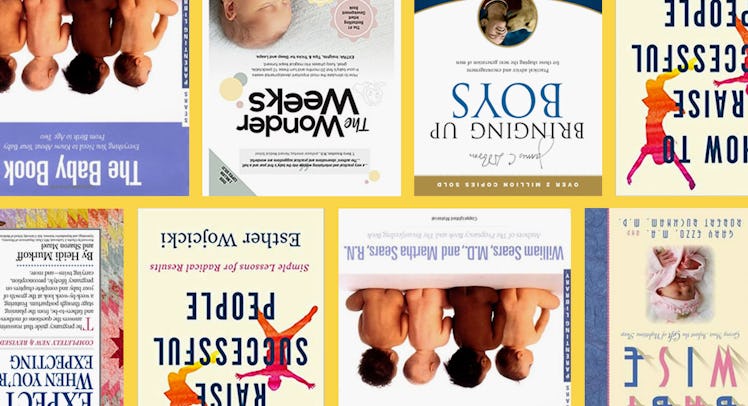6 Parenting Books That Are Absolutely Not Worth Your Time
The majority of parenting books are an unhelpful, condescending nightmare. These six books are among the worst offenders.

The saying goes that babies do not come with a manual. That fact has prompted thousands upon thousands of pediatricians, psychologists, and self-styled experts to build a robust market of parenting books. The best of these books find the right line between being too prescriptive and too cavalier. They offer parents practical tips while noting every kid is different so results may vary. And finally, they offer guidance based on sound scientific research.
Good parenting books are, however, few and far between. The majority of parenting books are an unhelpful, condescending nightmare. They treat babies as a problem to be solved and parenting as an emo shitshow of too much wine and self-recrimination. They truck in half-baked theories that have no basis in research, or they are based on religious ideologies that have little to do with loving a kid and more to do with controlling them. They guilt parents into thinking they have to do so much more than simply being present and read like instructions for diffusing a bomb. These are some of the most popular offenders.
What to Expect When You’re Expecting
As the go-to for so many parents, What to Expect is the grand-dame of parenting titles. It’s chock full of really sound information. The problem is that all the good stuff is buried in a tome that reads like advice from the most condescending saccharine friend you know. Hey, it’s good to be non-threatening, but the range of cheery euphemisms in What to Expect can be a bit mind-boggling. You can read the authors wide-unrelenting and ultimately unnerving smile in every sentence. The upshot is that the book sets a precedent of cheeriness at all costs, despite the fact that what comes after birth is often incredibly difficult. For those with complicated feelings, the unrelenting joviality of What to Expect can lead to some parental guilt when the thrill is gone.
On Becoming Babywise
The premise behind Gary Ezzo and Dr. Robert Buckman’s Babywise method is that there are “developmental achievements too valuable to be left to chance.” The Babywise idea is that while parents can’t control their child’s DNA or temperament, they can (and should) control everything else. What does the baby need or want? In many circumstances, Babywise suggests it doesn’t really matter, because they are babies and don’t know shit. Therefore it’s a parents task to shape them and make them conform to the happy household as designed by Ezzo and Buckman. Babywise can feel cruel and condescending and that, it would seem, is by design. After all, a parent will get nowhere by simply loving their kid, they need to control them too.
The Baby Book: Everything You Need to Know About Your Baby from Birth to Age Two
Written by famed pediatrician Dr. William Sears and his family, The Baby Book offers the antithesis of the Babywise method with its orientation to Attachment Parenting, a phrase and parenting style developed by Sears himself. When the Sears clan suggest parents be attached to their baby, they mean it literally. One of the foundational blocks on which the style is built is near constant babywearing. Also, parents are encouraged to respond to their babies cries immediately and sleep very close to them. It’s all very time consuming and intensive. What’s more, none of the techniques are backed by research. They were gleaned from parents in Sear’s practice who “appeared to have a handle on parenting.” With so little disregard for science, it’s really no wonder son Dr. Robert Sears is a prominent anti-vaxxer.
The Wonder Weeks: How to Stimulate Your Baby’s Mental Development and Help Him Turn His 10 Predictable, Great, Fussy Phases into Magical Leaps Forward
On the topic of science, the author of Wonder Weeks makes some incredible claims about milestones. Those claims are largely based on author Frans X. Plooij and Hetty van de Rijt’s research in child development. The idea is that there are weeks when a baby becomes fussy and unconsolable marking the moment they are about to make a big developmental leap. The problem is this is now how milestones work. No baby reaches the same milestones, at the same time in the same way. This is a book built from bad science. It’s telling that when a colleague Plooij studied his research, he found it contradicted the premise of Wonder Weeks. Plooij then attempted to block the research from being published. Scientists, it seems, can be scoundrels too.
Bringing Up Boys
Dr. James Dobson of Focus on the Family fame wrote Bringing Up Boys as a prescription for parenting with Evangelical faith. The problem is, of course, that kids don’t need religion or religious principles to grow into happy healthy adults. In fact, Dobson’s thoughts on boys are downright dangerous, particularly for boys who are gay. Consider the books chapter on homosexuality, which Dobson frames as a “sexual identity disorder” which can be corrected if boys are simply given the right guidance and parenting. The result of the complete bullshit is likely boys and parents who become estranged, depressed and broken. Shame on Dobson for his garbage book.
How to Raise Successful People
Author Esther Wojcicki is having a moment in the parenting guru spotlight. Dubbed the “Godmother of Silicon Valley” Wojcicki has raised three very successful daughters, two of whom are high-profile tech CEOs and another who is a fulbright-winning professor at the University of California. Her book, then, is a guide for how parents can follow in her footsteps. The problem is that there is far more relevant to Wojcicki’s daughter’s success than she could have ever hoped to control. The book is bait for parents who are stressed about their kids future earnings potential. Wojcicki might offer a roadmap, but it’s a map of her own very particular gated parenting community.